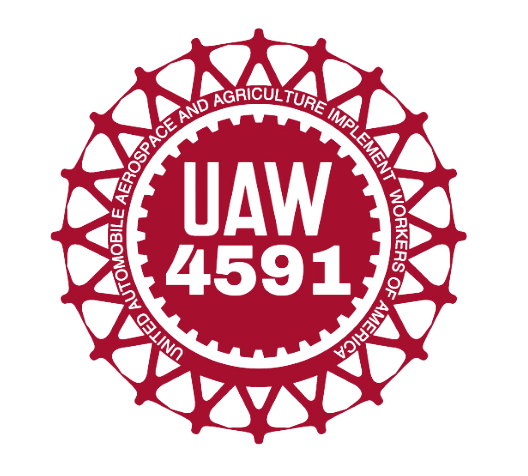This past Tuesday was a long day of back and forth in the bargaining room. Both sides passed many proposals, including a response from admin on our economic proposals; wages, healthcare, childcare, fees, and housing.
To find out more details about admin’s economic package, as well as other counterproposals discussed at bargaining, read on below. As a reminder, you can review all of the full proposals that were presented in the Bargaining Center & RSVP to attend upcoming bargaining sessions (August 23, September 7, September 19) here.
TL;DR:
- Admin passed counterproposals on Job Titles, Scope and Interpretation, Job Postings, and Grievances
- ASEs in bargaining passed counterproposals on Vacation, Layoffs, Union Rights, Grievance Procedure, and Holidays. ASEs received and passed back proposals on Scope & Interpretation and Job Postings.
- Admin put forward an economic package which presumes to resolve the proposals in Wages, Fees & Tuition, Childcare, Healthcare, Housing, Parking, Leaves, Vacation, and Holidays all at once
- Our August Monthly Meeting is on 8/23 at 5pm – register here to discuss WSU admin’s economic package and plans of action our union can take in response
The focus of our last session very quickly became wages. Admin presented a package of proposals in response to the economic proposals we presented in mid-summer (wages, childcare, housing, health insurance, etc.). In bargaining language, a package is functionally a bundle of proposals, where said pieces are not intended to be bargained separately. Typically, when a package proposal is made, a rejection of that package is a rejection of all pieces entirely. If rejected, the package could be taken off the table and each individual proposal contained in it would revert its previous form.
During the session, Admin finally admitted that their pay rates have fallen far behind when compared to peer institutions. It’s no surprise that it took our ASE team’s persistent, dedicated efforts and testimony to get them to admit this. Our initial proposal was to create a new base wage of $2498/mo (similar to step 70) for salaried ASEs at Pullman, with adjustments for other campuses and experience levels to meet living wage standards. Admin proposed creating a minimum wage of $1910.09 per month for salaried ASEs by eliminating steps 1-36 and placing ~500 ASEs previously in those steps at step 37 after a 2.5% increase. They claimed that their base wage proposal would increase wages for the lowest paid ASEs by 46%; this is misleading (most ASEs are placed no lower than step 26 as per Graduate school recommendation, which would be a 14% increase) and obfuscates the fact that their proposed new base wage is still only 17k for an ASE for a 9 month appointment. Their proposed 2.5% across-the-board increase to wages also simply reflects the state budget allocation that we have already been promised this biennium, and have been able to achieve regularly, even before bargaining began. We will not allow them to posture as if this is all they can offer.
Admin explained the reasoning for their package as: “We just don’t think we inhabit a world in which we think it’s realistic to think of everyone getting a 25% wage increase plus more health care plus childcare plus paid leave plus housing assistance, plus, plus, plus!” Our ASE team, on the other hand, knows that we inhabit a world in which these wages are far below what is liveable. Admin told us explicitly that although they find our proposals to be “beyond the world we live in”, they are “choosing not to lowball us”. While these raises are not enough, Admin’s proposal reflects the power of all the organizing we have done over the past few years. The nature of the response and the elimination of low pay steps in this package proposal are just the beginning of what we have the power to achieve.
We have a lot of work to do to win what we really deserve. Come deep dive WSU’S Wages proposal with us at the Monthly Meeting 8/23 5pm (RSVP here). Help us continue to build power to build towards greater success. If you want to get more involved, there will be opportunities to gain training to go deeper.
In Solidarity,
WSU-CASE Bargaining Committee:
Acacia Patterson, Physics & Astronomy (Pullman)
Adam Bozman, Carson College of Business – Finance (Pullman)
Andre Diehl, Comparative Ethnic Studies (Pullman)
Arianna Gonzales, Psychology (Pullman)
Aurora Brinkman, Psychology (Pullman)
Chelsea Mitchell, School of the Environment (Puyallup Research and Extension Center)
Chia-Hui Chen, Pharmacy and Pharmaceutical Sciences (Spokane)
Claudia Skinner, School of Languages, Cultures, and Race (Pullman)
Cody Lauritsen, College of Veterinary Medicine (Pullman)
Coty Jasper, Integrative Physiology & Neuroscience (Vancouver)
Dano Holt, School of the Environment (Pullman)
Evan Domsic, Crop and Soil Science (Mount Vernon NWREC)
Gavin Doyle, English (Pullman)
Hannah Cohen, Veterinary Clinical Sciences (Pullman)
Kartik Sreedhar, Physics & Astronomy (Pullman)
Kayla Spawton, Plant Pathology (Mount Vernon NWREC)
Kelsey King, School of Biological Sciences (Vancouver)
Miles Hopkins, School of the Environment (Pullman)
Miranda Zuniga-Kennedy, Clinical Psychology (Pullman)
Naseeha Cardwell, Chemical Engineering & Bioengineering (Pullman/Tri-Cities)
Natalie Yaw, Chemistry (Pullman)
Ninh Khuu, Plant Pathology (Prosser)
Peter Obi, Pharmaceutical Sciences (Spokane)
Raymond Bennett, Psychology (Pullman)
Rebecca Evans, Biology (Vancouver)
Shawn Domgaard, Communication (Pullman)
Tazin Rahman, Electrical Engineering & Computer Science (Pullman)
Tholen Justin Blasko, Animal Sciences (Pullman)
Victor Moore, History (Pullman)
Victoria Oyanna, Pharmacy and Pharmaceutical Sciences (Spokane)
Whitney Shervey, Sociology (Pullman)
Yiran Guo, Mechanical and Materials Engineering (Pullman)
